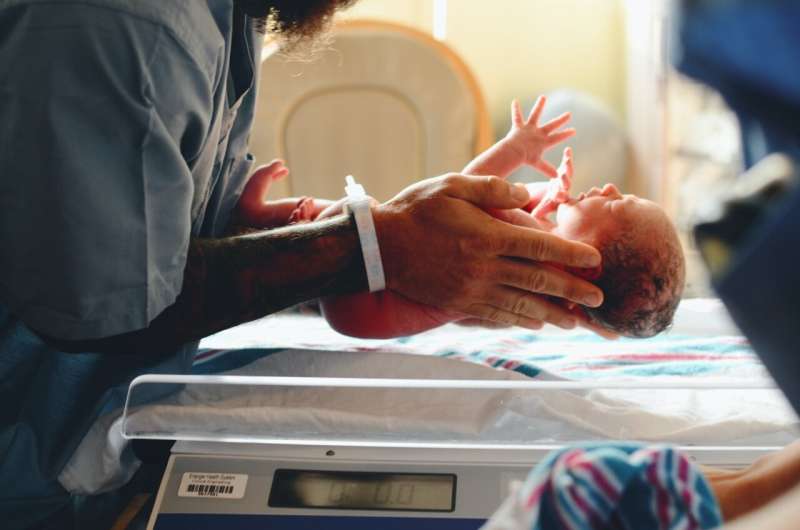This article has been reviewed according to Science X's editorial process and policies. Editors have highlighted the following attributes while ensuring the content's credibility:
fact-checked
proofread
Over 40% of healthy moms preparing for fecal transplant to C-section babies found to carry potentially harmful pathogens

A randomized trial assessing whether the oral transfer of gut microbiota from mother to baby can safely restore normal microbiota after cesarean section (C-section) has found that over 42% of healthy mothers tested positive for potentially harmful pathogens and were unable to proceed with the transplant.
The new research by Dr. Otto Helve from Helsinki University Hospital and the Finnish Institute of Health and Welfare and colleagues, being presented at this year's European Congress of Clinical Microbiology & Infectious Diseases (ECCMID) in Copenhagen, Denmark (April 15-18) underscores the importance of screening fecal, perineal and vaginal samples to ensure safety of the transplant process.
Birth by C-section is associated with an increased risk of many immune-related diseases, suggesting that the lack of maternal microbes in early life may have long-term health consequences for children.
Vaginally born infants receive gut bacteria from the mother at birth. But C-section babies are not exposed to maternal fecal microbes and this prevents the natural transfer of microbes from mother to baby.
Fecal microbiota transplantation (FMT) has been successfully used in adults to normalize gut microbiota composition and cure diseases such as recurrent Clostridium difficile infections.
The new randomized trial being conducted in Helsinki University Hospital is investigating whether the intestinal microbiota of C-section babies can be postnatally enriched by orally-delivered FMT from their own mothers within 2 hours of birth. The babies are either given 3.5 mg of the transplants or placebo mixed in mother's milk.
Because feces can contain dangerous pathogens, samples are first carefully and thoroughly screened.
The children will be followed for 24 months during which time, stool and blood samples are collected from the child and mother and analyzed for changes in the bacterial diversity in the microbiome between groups, and to assess immunological changes associated with the transfer such as response to vaccinations and function and interaction of immune cells in vitro.
Since autumn 2019, the trial has recruited 90 healthy pregnant women scheduled for elective C-section.
All of the mothers were asymptomatic (i.e., no diarrhea or abnormal bowel functions) and none had been prescribed antibiotics or traveled outside of Europe in the three months prior to screening.
Out of 90 tested mothers, 38 (42%) had pathogen positive samples and were not able to continue with the transplant (see link to poster in notes to editors with up-to-date data).
The most common pathogens were group B Streptococcus that can cause severe infection in newborns (GBS, detected in 14 samples), the parasite Dientamoeba fragilis (11 samples), and Helicobacter pylori bacteria that can damage the lining of the stomach and cause other diseases, like peptic ulcer (5 samples).
Additionally, extended-spectrum beta-lactamase (ESBL; an enzyme made by some bacteria that makes them resistant to antibiotics), enterohemorrhagic E. coli (EHEC; which produces a potent toxin that damages the lining of the intestinal wall, causing bloody diarrhea), and the parasite Blastocytis hominis, were found in two or more samples.
"The high rate of significant pathogens found in healthy mothers underscores that this procedure should be only performed after careful screening for potential pathogens," says Dr. Helve.
"Healthy people typically carry low levels of harmful bacteria in and on their bodies. But when a person is healthy, these pathogens don't cause disease; they simply coexist in an abundance of beneficial microbes. However, some, like group B Streptococcus can cause life-threatening infection in the newborn."
He continues, "So far 31 babies have received the transplant or placebo without any noticeable side effects, and in May 2023 we will begin assessing whether FMT can enrich the gut microbiota of C-section babies to match that of those vaginally born."



















